'NHS is broken' say striking ambulance staff in West
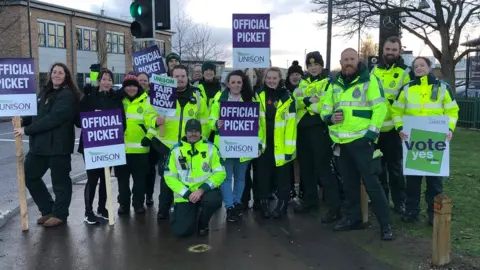 BBC
BBCAmbulance workers in the West are striking in a dispute over pay and working conditions.
Picket lines have formed in Bristol, Somerset, Gloucestershire and Wiltshire on Wednesday.
Disruption is expected to be extensive and NHS leaders have warned that patient safety is at risk.
Ambulances will be responding to life-threatening situations but people are asked to only call 999 in life-threatening situations.
Paramedics, control room staff and support workers, who are members of the Unison, GMB and Unite unions, are striking across much of England and Wales.
Unions representing ambulance workers want pay increases to keep up with the rising cost of living. They have not set a specific figure but argue any offer needs to be high enough to prevent a recruitment crisis.
However, ministers say they will not negotiate on pay as they have met independent pay recommendations.
Chris Hewett, paramedic and Unison member, was at the picket line in Filton. He said: "It's been a relatively quiet morning, we're at a third of our normal 999 level.
"So it means the public are supporting us and looking after themselves and find other ways of caring themselves other than calling 999."
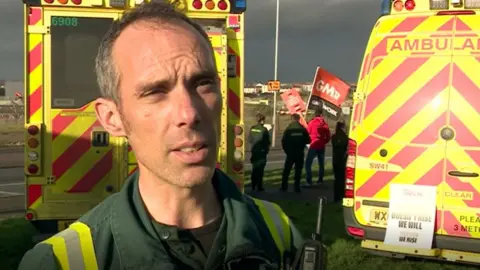
Wednesday's strike comes after South Western Ambulance Service declared a critical incident on Tuesday, after they had more than 700 calls waiting to be dispatched.
Mr Hewett said: "When I came on shift yesterday there were over 750 999 calls that we had not been able to get ambulances to across the region.
"That's a normal day - it's quieter today because people are aware of the strike but it shows that the NHS is broken and the ambulance service is crippled by a lack of funding and a real recruitment and retention crisis."
The armed forces have been drafted in to help manage any impact of today's strike with about two dozen army medics brought in to help South Western Ambulance Service, according to Mr Hewett.
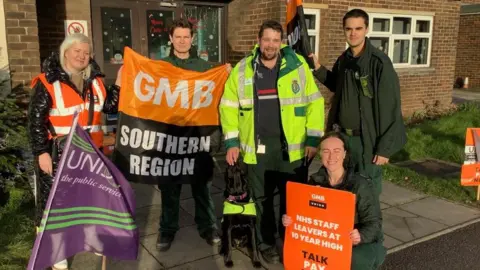
The paramedic said wages have gone down 20 per cent in real terms and Unison members were prepared to keep going with strike action.
"What we're saying to people, if they need us, then dial 999 and someone will come and help," he said.
NHS bosses in Somerset have also warned today services are under "extreme pressure" not just due to strikes but due to a combination of cold weather, concerns about Strep A infections, and an increase in Flu.
Bernie Marden, chief medical officer, NHS Somerset said: "Regardless of any industrial action taking place, it is important that patients who need urgent medical care continue to come forward."
Connor Calby, a paramedic who works across Bristol and Somerset said to BBC Radio Bristol that staff were struggling to pay their energy bills and with the wider cost of living crisis.
The Unison member said staff had been put in a "very difficult" position over striking.
He said: "We all joined this profession because we wanted to make a difference to people and make sure they got the best care and none of us took it lightly.
"In the South West 85.6 per cent of us were in favour of strike action and I think that says volumes about how everyone feels at the moment."
Chris Nelson, Gloucestershire Police and Crime Commissioner said the sheer demand on the ambulance services has led to resources being lost from police.
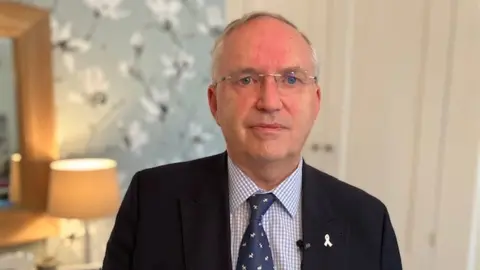
He said: "Over the last six months we have had a lot more involvement with NHS-related issues where our partners can't meet their demand.
"On average we have 50 or so calls a day in the force control room about ambulance-related issues to do with concerns for welfare."
Mr Nelson gave an example of an incident last week where police had to convey an elderly man to hospital after a fall on the ice which left him with a suspected hip and leg injury. The waiting time for an ambulance to arrive was estimated to be six hours.
Four police units, meaning at least four officers but possibly eight, attended along with and a fire unit which could have had four to five fire officers.
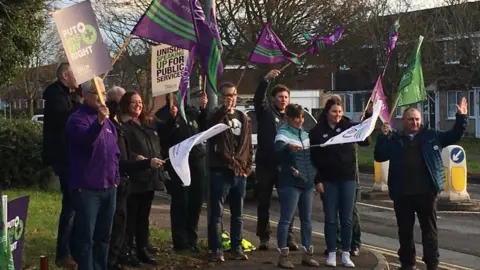
Police and the fire officers spent two hours asking for an ambulance to attend, Mr Nelson said.
Eventually they took the man to hospital on a stretcher at the request of ambulance service but were then turned away from Cheltenham Hospital and told to go to Gloucestershire Royal Hospital.
Mr Nelson added he was "sympathetic" to those striking over low pay.
Further strike action is planned on 28 December and concerns have been raised over its impact considering it comes after four bank holidays.
What's happening in my area?
Not all unions are striking for the same hours of Wednesday. And it is difficult to say how many workers are striking at each individual service. In some areas, such as the East of England, there is no current plan to strike.
You can use our interactive tool to find out which unions are on strike at your ambulance service:

Follow BBC West on Facebook, Twitter and Instagram. Send your story ideas to: [email protected]
